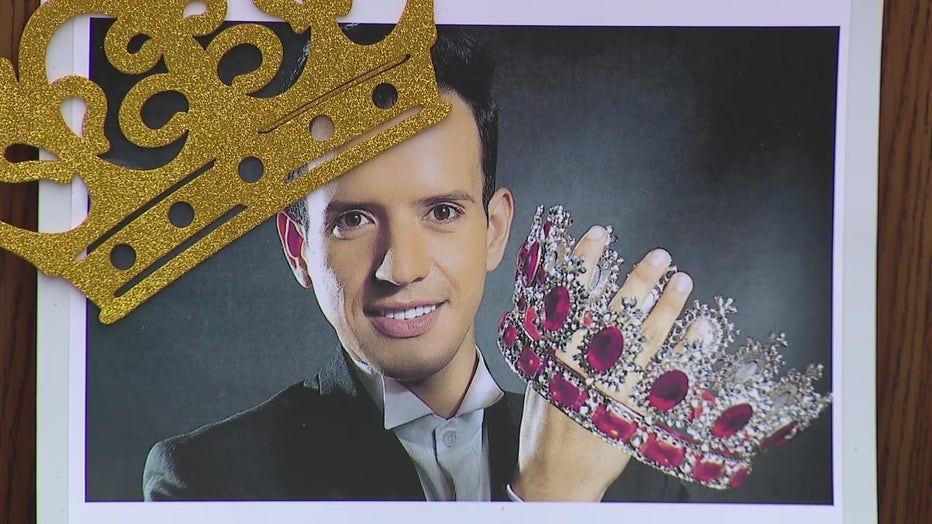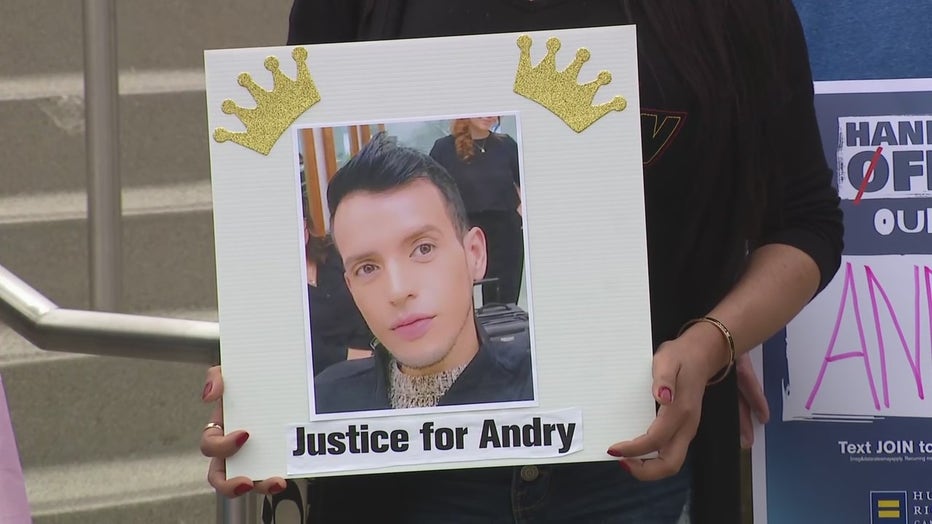Andry Hernandez Romero: Gay asylum seeker deported to prison built for gang members prompts outcry in WeHo

LGBTQ rally for deported gay Venezuelan hairdresser
Andry Hernandez Romero, a gay Venezuelan makeup artist, was deported to El Salvador and is detained in a dangerous prison, raising concerns about human rights violations.
The deportation of Andry Hernandez Romero, a gay Venezuelan makeup artist, has ignited a passionate response from the LGBTQ+ community in West Hollywood, who are demanding justice and his safe return to the United States.
Romero, who sought asylum in the U.S., is now detained in a supermax prison in El Salvador, known for its inhumane conditions and harsh treatment of inmates. His case has sparked outrage and condemnation from legal advocates, activists, and elected officials, who are calling for immediate intervention and systemic reform.
Deported to El Salvador despite seeking asylum
What we know:
Romero was deported to El Salvador despite seeking asylum in the United States. He followed legal procedures to request refuge but was detained at the California border and later disappeared from an ICE detention center. He is now held in one of the world’s most dangerous supermax prisons, a facility designed for gang members, and has been cut off from all contact with his family and legal representatives. Activists say the deportation is a severe violation of human rights, calling it a "death sentence" due to the prison's harsh conditions and lack of protections for LGBTQ+ individuals.

Andry Hernandez Romero
Forced to flee his home country for safety
The backstory:
Romero’s journey began in Venezuela, where he faced significant threats as a gay individual in a country with a history of violence and discrimination against the LGBTQ+ community, according to CBS News. Forced to flee his home country, Romero sought safety in the United States, following legal procedures to apply for asylum. His story is emblematic of the dangers faced by LGBTQ+ migrants who escape violent environments only to encounter further challenges within the U.S. immigration system.
While the exact sequence of events leading to his deportation remains unclear, his case reflects a broader issue of vulnerable asylum seekers being at risk of being sent back to unsafe countries. El Salvador, a country known for its high levels of violence, particularly against marginalized groups, became the destination for Romero’s forced return. Activists have raised alarms about the perilous conditions he now faces in El Salvador’s supermax prisons, where he is at risk due to his sexual orientation.
Lack of transparency by ICE, Homeland Security
What we don't know:
It is unknown whether U.S. immigration authorities followed proper protocol or what justification they provided for his removal. There has been no contact with Romero since his deportation, and the exact conditions of his confinement in El Salvador have not been confirmed. CBS News reported the absence of transparency in the case, which has left advocates and family members desperate for answers.
It is also uncertain what actions, if any, are being taken by ICE or DHS to reassess his asylum case or ensure his safety. Advocates are calling for immediate intervention from U.S. authorities to review his case and address the risks he faces.
Tattoos and deportation
Romero's deportation has raised concerns about the use of tattoos as a basis for determining gang affiliation. ICE officials have cited tattoos as indicators of gang membership, specifically linking individuals to the Tren de Aragua gang. However, experts have criticized this approach, arguing that tattoos are not reliable identifiers of gang affiliation and may lead to wrongful deportations.
In Romero's case, his tattoos—such as crowns over the words "Mom" and "Dad"—are personal and familial in nature, not indicative of gang ties, his attorney Lindsay Toczylowski, told CBS News. Toczylowski has stated that Romero has no criminal record and was seeking asylum due to threats against him in Venezuela. The reliance on tattoos as evidence of gang affiliation has been a point of contention, with many arguing that it unfairly targets individuals based on personal expressions rather than criminal behavior.
Timeline:
Romero’s deportation has become a central issue among LGBTQ+ activists and elected leaders. His case was brought up during a West Hollywood council meeting last week and at a press conference demanding justice. Legal representatives from the Immigrant Defenders Law Center and leaders from LGBTQ+ organizations have rallied to shine a spotlight on his case. A state rally is being planned in his name to raise awareness and pressure federal agencies to act.

Andry Hernandez Romero
Legal advocates and activists are seeking more public visibility of Romero's plight, hoping it will generate enough pressure to force a swift response from U.S. immigration authorities.
What they're saying:
Anger and heartbreak over Romero’s deportation have poured out from LGBTQ+ leaders, elected officials, and legal advocates. In West Hollywood, Mayor Chelsea Byers emphasized the city’s commitment to protecting vulnerable communities, saying the city "will always be a safe place for marginalized individuals" and voicing solidarity with Romero and others "whose dignity is threatened by unjust systems."
At the Los Angeles LGBT Center, CEO Joe Hollendoner called the situation "a moral failure of our immigration system," and went further, labeling the deportation "state-sponsored violence." His comments reflect growing frustration over what many see as systemic neglect and cruelty.
From the Latino Equality Alliance, Executive Director Eddie Martinez highlighted the need for urgent compassion and action. He urged public figures to step up, saying, "Influential figures like Melania Trump should speak up. This is about human dignity."
Queen Victoria Ortega, President of FLUX International, framed the situation as part of a broader crisis of values in America. "This is about redefining the American dream," she said. "Andry’s deportation challenges our values. We will not rest until justice is served."
Legal representatives at the Immigrant Defenders Law Center shared their disbelief and frustration. "We were shocked by Andry’s disappearance from ICE custody," they said, pointing to a disturbing lack of communication and transparency. "There has been zero communication… We are fighting to bring him home."
Systemic issues within the immigration system
Why you should care:
Romero’s case underscores systemic issues in the U.S. immigration system, especially in the treatment of LGBTQ+ individuals. It raises urgent concerns about human rights, due process, and the ethical responsibilities of governments toward vulnerable populations. His story serves as a stark reminder of the dangers faced by LGBTQ+ asylum seekers and the importance of maintaining oversight and accountability in immigration enforcement. This is more than one case—it is a call to action for justice and systemic change.
The fight for Romero's return
What's next:
Activists, legal advocates, and elected officials are demanding that ICE and DHS intervene immediately to bring Romero back to the United States and ensure his asylum case is properly reviewed. A statewide rally is being organized in his name, and public pressure is building for federal authorities to respond. The Los Angeles LGBT Center and Immigrant Defenders Law Center are continuing to provide legal support and call on the public to advocate for Romero’s release. The fight for his freedom—and the broader fight for LGBTQ+ immigrants—continues.
The Source: Information in this article comes from statements made by speakers during a West Hollywood council meeting and a subsequent press conference, highlighting the urgency of Andry Hernandez Romero's situation.

